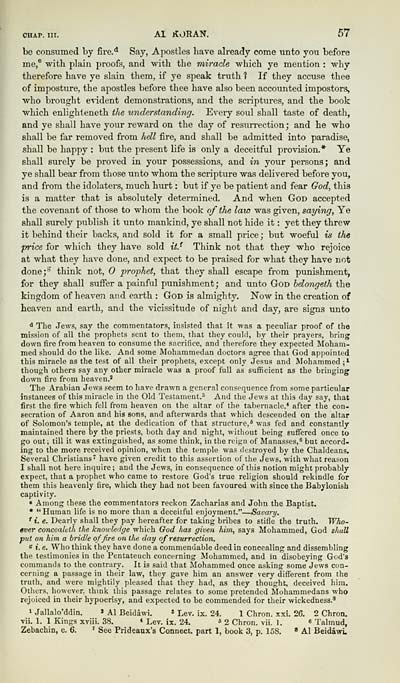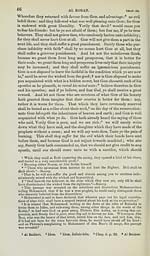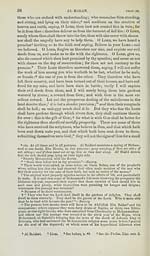Download files
Complete book:
Individual page:
Thumbnail gallery: Grid view | List view

CHAP. in. AI KORAN. 57
be consumed by fire.*^ Say, Apostles have already come unto you before
me,® with plain proofs, and with the miracle which ye mention : why
therefore have ye slain them, if ye speak truth ? If they accuse thee
of imposture, the apostles before thee have also been accounted impostors,
who brought evident demonstrations, and the scriptures, and the book
which enlighteneth tlte understanding. Eveiy soul shall taste of death,
and ye shall have your reward on the day of resurrection ; and he who
shall be far removed from ]iell fire, and shall be admitted into paradise,
shall be happy : but the present life is only a deceitful provision.* Ye
shall surely be proved in your possessions, and in your persons; and
ye shall bear from those unto whom the scripture was delivered before you,
and from the idolaters, much hurt : but if ye be patient and fear God, this
is a matter that is absolutely detei-mined. And when God accepted
the covenant of those to whom the book of the law was given, saying, Ye
shall surely publish it unto mankind, ye shall not hide it : yet they threw
it behind their backs, and sold it for a small price; but woeful is the
price for which they have sold it.^ Think not that they who rejoice
at what they have done, and expect to be praised for what they have not
done;^ think not, prophet, that they shall escape from punishment,
for they shall suffer a painful punishment; and unto God belongeth the
kingdom of heaven and earth : God is almighty. IsTow in the creation of
heaven and earth, and the vicissitude of night and day, are signs unto
^ The Jews, say the commentators, insisted that it was a peculiar proof of the
mission of all the prophets sent to them, that they could, by their prayers, bring
down fire from heaven to consume the sncrifice, and therefore they expected Moham-
med should do the like. And some Mohammedan doctors agree that God appointed
this miracle as the test of all their prophets, except only Jesus and Mohammed ;!■
though others say any other miracle was a proof full as sufficient as the bringing
down fire from heaven.'
The Arabian Jews seem to have drawn a general consequence from some particular
instances of this miracle in the Old Testament.^ And the Jews at this day say, that
first the fire which fell from heaven on the altar of the tabernacle.* after the con-
secration of Aaron and his sons, and afterwards that which descended on the altar
of Solomon's temple, at the dedication of that structure,* was fed and constantly
maintained there by the priests, both day and night, without being suffered once to
go out ; till it was extinguished, as some think, in the reign of Manasses,^ but accord-
ing to the more received opinion, when the temple was destroyed by the Chaldeans.
Several Christians^ have given credit to this assertion of the Jews, with what reason
I shall not here inquire; and the Jews, in consequence of this notion might probably
expect, that a prophet who came to restore God's true religion should rekindle for
them this heavenly fire, which they had not been favoured with since the Babylonish
captivity.
• Among these the commentators reckon Zacharias and John the Baptist.
• "Human life is no more than a deceitful enjoyment." — Savary,
' t. e. Dearly shall they pay hereafter for taking bribes to stifle the truth. Who-
ever concealeth the knowledge which God has given him, says Mohammed, God shali
put on him a bridle of fire on the day of resurrection.
e i. e. Who think they have done a commendable deed in concealing and dissembling
the testimonies in the Pentateuch concerning Mohammed, and in disobeying God's
commands to the contrary. It is said that Mohammed once asking some Jews con-
cerning a passage in their law, they gave him an answer very dilTerent from the
truth, and were mightily pleased that they had, as they thought, deceived him.
Others, however, thmk this passage relates to some pretended Mohammedans who
rejoiced in their hypocrisy, and expected to be commended for their wickedness.^
1 Jallalo'ddin. * Al Beidawi. » Lev. ix. 24. 1 Chron. xxi. 26. 2 Chron.
vii. 1. 1 Kings xviii. 38. * Lev. ix. 24. » 2 Chron. vii. 1. « Talmud,
Zebachin, c. 6. » See Prideaux's Connect, part 1, book 3, p. 158. » AI BeidawL
be consumed by fire.*^ Say, Apostles have already come unto you before
me,® with plain proofs, and with the miracle which ye mention : why
therefore have ye slain them, if ye speak truth ? If they accuse thee
of imposture, the apostles before thee have also been accounted impostors,
who brought evident demonstrations, and the scriptures, and the book
which enlighteneth tlte understanding. Eveiy soul shall taste of death,
and ye shall have your reward on the day of resurrection ; and he who
shall be far removed from ]iell fire, and shall be admitted into paradise,
shall be happy : but the present life is only a deceitful provision.* Ye
shall surely be proved in your possessions, and in your persons; and
ye shall bear from those unto whom the scripture was delivered before you,
and from the idolaters, much hurt : but if ye be patient and fear God, this
is a matter that is absolutely detei-mined. And when God accepted
the covenant of those to whom the book of the law was given, saying, Ye
shall surely publish it unto mankind, ye shall not hide it : yet they threw
it behind their backs, and sold it for a small price; but woeful is the
price for which they have sold it.^ Think not that they who rejoice
at what they have done, and expect to be praised for what they have not
done;^ think not, prophet, that they shall escape from punishment,
for they shall suffer a painful punishment; and unto God belongeth the
kingdom of heaven and earth : God is almighty. IsTow in the creation of
heaven and earth, and the vicissitude of night and day, are signs unto
^ The Jews, say the commentators, insisted that it was a peculiar proof of the
mission of all the prophets sent to them, that they could, by their prayers, bring
down fire from heaven to consume the sncrifice, and therefore they expected Moham-
med should do the like. And some Mohammedan doctors agree that God appointed
this miracle as the test of all their prophets, except only Jesus and Mohammed ;!■
though others say any other miracle was a proof full as sufficient as the bringing
down fire from heaven.'
The Arabian Jews seem to have drawn a general consequence from some particular
instances of this miracle in the Old Testament.^ And the Jews at this day say, that
first the fire which fell from heaven on the altar of the tabernacle.* after the con-
secration of Aaron and his sons, and afterwards that which descended on the altar
of Solomon's temple, at the dedication of that structure,* was fed and constantly
maintained there by the priests, both day and night, without being suffered once to
go out ; till it was extinguished, as some think, in the reign of Manasses,^ but accord-
ing to the more received opinion, when the temple was destroyed by the Chaldeans.
Several Christians^ have given credit to this assertion of the Jews, with what reason
I shall not here inquire; and the Jews, in consequence of this notion might probably
expect, that a prophet who came to restore God's true religion should rekindle for
them this heavenly fire, which they had not been favoured with since the Babylonish
captivity.
• Among these the commentators reckon Zacharias and John the Baptist.
• "Human life is no more than a deceitful enjoyment." — Savary,
' t. e. Dearly shall they pay hereafter for taking bribes to stifle the truth. Who-
ever concealeth the knowledge which God has given him, says Mohammed, God shali
put on him a bridle of fire on the day of resurrection.
e i. e. Who think they have done a commendable deed in concealing and dissembling
the testimonies in the Pentateuch concerning Mohammed, and in disobeying God's
commands to the contrary. It is said that Mohammed once asking some Jews con-
cerning a passage in their law, they gave him an answer very dilTerent from the
truth, and were mightily pleased that they had, as they thought, deceived him.
Others, however, thmk this passage relates to some pretended Mohammedans who
rejoiced in their hypocrisy, and expected to be commended for their wickedness.^
1 Jallalo'ddin. * Al Beidawi. » Lev. ix. 24. 1 Chron. xxi. 26. 2 Chron.
vii. 1. 1 Kings xviii. 38. * Lev. ix. 24. » 2 Chron. vii. 1. « Talmud,
Zebachin, c. 6. » See Prideaux's Connect, part 1, book 3, p. 158. » AI BeidawL
Set display mode to: Large image | Transcription
Images and transcriptions on this page, including medium image downloads, may be used under the Creative Commons Attribution 4.0 International Licence unless otherwise stated. ![]()
| Early Gaelic Book Collections > J. F. Campbell Collection > Koran: or, Alcoran of Mohammed > (211) |
|---|
| Permanent URL | https://digital.nls.uk/77136416 |
|---|
| Description | Volumes from a collection of 610 books rich in Highland folklore, Ossianic literature and other Celtic subjects. Many of the books annotated by John Francis Campbell of Islay, who assembled the collection. |
|---|
| Description | Selected items from five 'Special and Named Printed Collections'. Includes books in Gaelic and other Celtic languages, works about the Gaels, their languages, literature, culture and history. |
|---|

